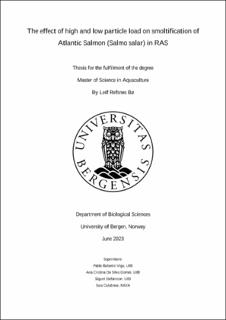The effect of high and low particle load on smoltification of Atlantic Salmon (Salmo salar) in RAS
Master thesis
Permanent lenke
https://hdl.handle.net/11250/3108575Utgivelsesdato
2023Metadata
Vis full innførselSamlinger
- Master theses [265]
Sammendrag
This study explores the effect of high and low Total Suspended Solids (TSS) on smoltification, and ion regulation of Atlantic salmon (Salmo salar) reared in a Recirculating Aquaculture System (RAS). As the salmon aquaculture faces challenges, including sealice, disease, and environmental stressors while in open sea cages, the industry is progressively turning towards land-based RAS to reduce the time salmon smolts spend in seawater. Within these systems, TSS can accumulate if not properly managed, posing a potential threat to fish health and welfare.
Effect of TSS on smoltification and ion regulation of Atlantic salmon in RAS was studied through analysis of Na+/K+ ATPase (NKA) activity, gene expression of isoforms nkaa1a nkaa1b and nkcc1a and plasma concentration of sodium and chloride. The results indicate that a high TSS concentration within the frame of this experiment might affect the smoltification timeline and induce physiological stress. However, Atlantic salmon exhibit compensatory and adaptive mechanisms to ensure successful smoltification under the tested conditions. Despite this resilience, to optimize smoltification, growth and health for salmon in commercial RAS, results from this study suggest maintaining low TSS concentrations and avoid sudden peaks until the fish are transferred to seawater.
